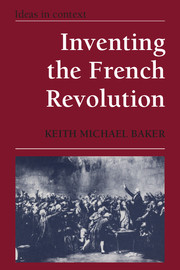Book contents
- Frontmatter
- Contents
- Acknowledgments
- Introduction
- 1 On the problem of the ideological origins of the French Revolution
- Part I French history at issue
- Part II The language of politics at the end of the Old Regime
- Part III Toward a revolutionary lexicon
- 9 Inventing the French Revolution
- 10 Representation redefined
- 11 Fixing the French constitution
- Notes
- Index
10 - Representation redefined
Published online by Cambridge University Press: 05 June 2012
- Frontmatter
- Contents
- Acknowledgments
- Introduction
- 1 On the problem of the ideological origins of the French Revolution
- Part I French history at issue
- Part II The language of politics at the end of the Old Regime
- Part III Toward a revolutionary lexicon
- 9 Inventing the French Revolution
- 10 Representation redefined
- 11 Fixing the French constitution
- Notes
- Index
Summary
“The idea of representatives is modern; it comes to us from feudal government, that iniquitous and absurd government in which the human species is degraded and the name of man is dishonored.” So wrote Rousseau in a famous passage of Du contrat social repudiating the practice of representation as incompatible with the principle of the general will. “The law is the expression of the general will. All citizens have the right to participate personally, or through their representatives, in its formation.” So proclaimed the National Assembly in its Declaration of the Rights of Man. It is one of the paradoxes of the French Revolution that the revolutionaries, in repudiating the old order that they saw as the feudal regime and in embracing the principle of popular sovereignty inherent in the concept of the general will, nevertheless fell back upon the practice of representation so explicitly condemned by Rousseau. The intellectual context in which they did so, and the implications of their action for the principle of representation, form the subject of this essay.
The traditional logic
“A multitude of men, are made one person, when they are by one man, or one person, represented.‥,” Hobbes argued in Leviathan. “For it is the unity of the representer, not the unity of the represented, that maketh the person one. And it is the representer that beareth the person, and but one person: and unity, cannot otherwise be understood in multitude.”
- Type
- Chapter
- Information
- Inventing the French RevolutionEssays on French Political Culture in the Eighteenth Century, pp. 224 - 251Publisher: Cambridge University PressPrint publication year: 1990
- 3
- Cited by

